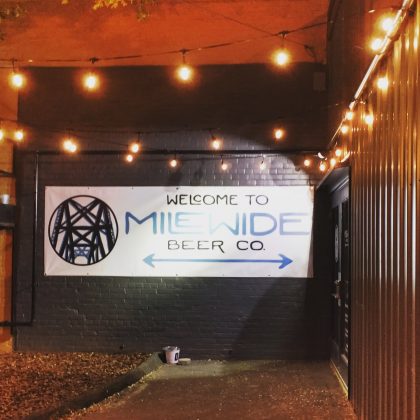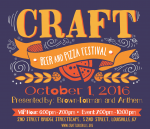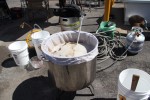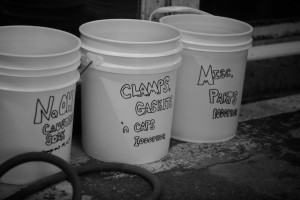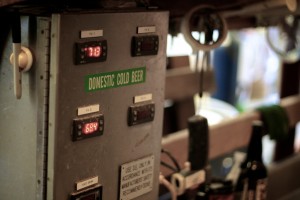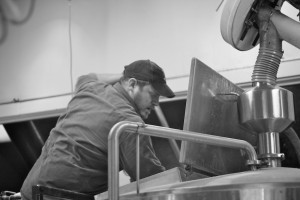Jeremy Hunt recently relocated to Louisville from Delaware to become the Head Brewmaster at BBC. He was formerly the Head Brewer at Dogfish Head Brewery, and worked closely with everyone’s favorite Rock-Star-Brewery-Owner, Sam Calagione.

Jeremy Hunt recently relocated to Louisville from Delaware to become the Head Brewmaster at BBC. He was formerly the Head Brewer at Dogfish Head Brewery, and worked closely with everyone’s favorite Rock-Star-Brewery-Owner, Sam Calagione.
So, here’s something I learned last week: Brewer’s hours are a lot different than Freelance Designer’s hours. Jeremy Hunt emailed me the day before we were to get together for this interview to tell me he’d be in by 6am and mashing in by 7am. By the time I strolled in at 8:30, Jeremy had already broken a sweat or two, while I hadn’t even finished my coffee.
Once Jeremy slowed down enough for me to catch up with him, he let me ask him a few questions about his past, what he’s working on now, and the future he’s building with BBC.
John Wurth: How did you get started brewing beer?
Jeremy Hunt: I was in college, and my wife and I studied in Europe for a little bit, and I got into beer while I was over there. Like, good beer. My first beer was a Samuel Adams Scotch Ale. I’ve never had to drink bad beer, but when I got over there, it was like a whole different thing. Every weekend, someone went to Belgium and brought back a bunch of different beer, and I just kinda got hooked. So, when we came back to Ohio, I rented a house with some friends, and my wife and I started homebrewing. So, she would come over and we would brew together. I decided to make a job out of it, so I wrote a bunch of emails one Spring Break to about 10 of the top breweries back in 2003. Stone, Dogfish Head, Mercury (out of Ipswich, Massachusetts). There a bunch more, I don’t remember all of them, most of them were in the Northeast, like Smutty Nose. I wanted to go into a production brewery for sure. I got 5 emails back and I got 2 job offers on the same day, and I decided to go with Mercury. They kind of gave me my start. I wasn’t married at the time, my wife was still in college, and I got to brew beer, drink all day, but I started out washing kegs like most people starting out. It was fun! [laughter]
JW: How do you like Louisville so far?
JH: I hate it! No, I love it a lot [laughter]. It’s great. It has a little bit of a small town feel to it, but there’s still the same accommodations that you would have in a bigger city. To us, that meant a lot, because Delaware didn’t have a lot, we’d have to go to DC or Philly or something. There’s some culture, and we’re hardcore Catholic so the churches are great, we get to go to Latin mass and stuff. It’s kinda neat, because we’re old school like that.
JW: Do you find the people here are friendlier than people up North? Do we have the Southern vibe you’ve always heard about?
JH: Everybody every where I’ve been has been kind of friendly. I think you get treated the same way you treat folks. Maybe people just treat one another better down here. I’ve found everyone to be really nice so far, but I’ve also found nice folks in New Hampshire, and Delaware too. We’ve been blessed and not lived in, like, nasty places. I’m a real fan of everyone I’ve met and I haven’t, let me think about that, no I haven’t met an asshole yet [laughter]. So, that’s sayin’ something.
JW: How many times have you been called “Honey” or “Sugar”?
JH: A lot. [laughter] That’s different. I think people are coming on to me. That hasn’t happened in years! [laughter]
JW: What do you have in store for BBC? Any special top secret projects you can let us in on?
JH: I’m trying to have an IPA on all the time. Probably every week and a half, we’re going to be brewing an IPA. I kinda got rid of the lambic program that was going on here that no one really knew about, and I’ve started my own. I brought in some fresh wine barrels and started to fool around with some Brettanomyces. It’s gonna be a year plus in the making, maybe two, but I do like the way that the Belgium character of beer and wood and the funk notes from the Brettanomyces, I kind of like the way they interplay. So, we’ll see what I can screw around with some local fruits, I know the blackberry is kind of a big thing around here, so I’d like to screw around with that. Maybe some other things that people hadn’t thought of in a lambic. Maybe even doing just straight lambic. I really like a nice un-fruited lambic. That’s something that I’m into personally, but I mean, Pat (Hagan – Owner, BBC) has kind of given me free reign to go nuts with that. It has to be when I have time. I’ve tasked Andrew (Dimery- Assistant Brewer), just to grow him as a brewer, with trying to come up with a good way to do turbid mashing. You need a very dextrinous wort to use in lambics, and he’s come back with some really interesting ideas. I think we’re gonna do some fun things. I’m excited.
JW: Have you hit all the other local breweries?
JH: I have been to Cumberland, and they were super nice and their beer was awesome. I went to Against the Grain, where I saw you, and their beer is awesome too. I finally met Jerry (Gnagy – Against the Grain) at the Winterfest up in Indianapolis, and that was cool, he’s a really nice guy, and I think we’re gonna get along pretty well. I’ve met (David) Pierce (NABC, head brewer) a couple of times. Pretty much, I think I’m gonna know everybody through the Kentuckiana Brewer’s Guild. I’ve got some pretty big ideas that I was discussing with Phil (Dearner – BBC), some things that I’d like to promote through that, where we can have collective bargaining power against the people that we get our malts and hops from. Maybe get better deals as a collective. I found that everybody’s so friendly, as far as the brewers, you know, there’s no real animosity on our parts at all, I don’t think anyway. So, I figured if one does well, we all do well, and that’s kind of why I was inpired to do something like that. Pat and I were discussing, that this is getting to be enough of a beer town. For me, it’s a real beer town, I mean, the only one I can really compare it to would be Portland, Maine. They’re very, very similar. There’s a lot of different brewpubs and stuff.
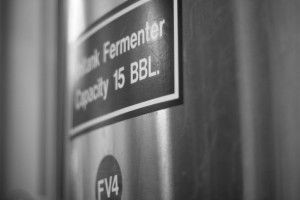 JW: Have you been over to New Albanian yet?
JW: Have you been over to New Albanian yet?
JH: I have, yeah, I’ve been to both locations. Man, their beer’s good. [laughter]
JW: Yeah, it really is.
JH: Pierce is a good brewer. I could tell that immediately just by reading their records. Pierce and Jerry both, are great brewers. I think we were discussing it when I saw you last, but, I wouldn’t have a job if it weren’t for someone like Pierce. Because, like, realistically, they got people through those hard time in the mid to late 90’s when everybody was closing. Craft beer wouldn’t be what it is if is wasn’t for Pierce and folks like him. You see Fritz Maytag (former owner of Anchor Steam in San Francisco) and Ken Grossman (Owner, Sierra Nevada Brewing Company) and even the guy who started Red Hook. Those guys were kind of the pioneers, more Fritz Maytag than anybody, but still…Jim Koch (Boston Beer Company/Samuel Adams) too, just those pioneers of craft beer. That was the first wave. The second wave came from people like Pierce and the fellow that taught me how to brew. His name is Jim Dorau and he’s awesome. He’s still at Mercury, he’s been there a long time. He was at Pyramid long ago before that.
I kind of feel like I’m that third wave. So we’re just kinda standing on the shoulders of giants, which is kinda the only way you get anywhere, and break new ground, is by realizing what people have done in the past to put you where you are.
JW: So, how was Winterfest this year?
JH: Awesome. I had a lot of really good beer. I mean, not a lot, I had to drive home so…[laughter]
JW: Best music to brew beer to?
JH: Reggae.
JW: Besides any BBC beers, what is one of your favorite local beers you’ve had so far.
JH: I really like that (New Albanian Brewing Company) Yakima Rye. I like that beer a lot. I have had the (New Albanian Brewing Company) Hoptimus, and I like it, but I kinda tend to shy away from 9% alcohol beers and above. Dogfish Head made more 9% alcohol beers and up than any other brewery on the planet. For me, that’s not something you can sit down and drink. 7%…maybe. But I kinda like to keep it 7% and under unless it’s like a real special thing or drinking a Belgian with my wife or some friends or something like that, then I’ll drink a higher gravity beer.
JW: Hoptimus is one of my favorite beers.
JH: Yeah, Hoptimus is a BIG beer. It is a monster. It is an absolute sexy beast. [laughter]
JW: What was one of your favorite beers that you created at Dogfish Head?
JH: I liked my Belgian Double IPA. I really, really enjoyed that. Actually the best beers that I had when I was there, were the ones coming out of the brewpub. Josh Tierney, he’s up at Allagash now, he brewed a Black IPA that I liked alot. He did it before it was like, “oooh”, this big thing. He did a very good job on that. Researched it a lot. It was a good beer.
The best one I had there was this kid Todd, who moved on to Brewer’s Alley, I think it’s called, in Baltimore, he brewed this Gose that absolutely mind-bending. It was a perfect session beer. Absolutely perfect. Like, if you thought of like a Berliner Weisse, but a little bit more sour, and then he added Hawaiian sea salt or something to it, and you drank it, then it just dried out completely and made you want to have another sip. It was like 4%, so you could drink like 4 and be just fine.
JW: I recently re-watched the TV show Brew Masters, which you mentioned was during your tenure at Dogfish Head. Were they filming you the whole time you were working, I mean, would they be filming us, like, right now? Was it completely in your face?
JH: It could be. I mean, you could kinda get around them. I was the head brewer, so I could just go wherever I wanted to, as far as like if I said, “Hey go downstairs and do this, I’ll be up here” it was sorta so I could hide from them, which kinda worked out to my advantage really. You could get away from it. You didn’t have to be on camera. But you had to sign a waiver just in case. We weren’t all part of the Screen Actors’ Guild or any of that nonsense. They pretty much ran around like 4-5 people.
JW: How long did that go on? There was only one season, so…
JH: It seemed like it was over a year. Just about every day. It’s different from what you think though, because what you see was this [gestures] but what you don’t see is the microphones, and the lights, and the director over here, telling you to do something you just did again, and, someone over here who’s I don’t know what.
JW: Did it inhibit your process at all?
JH: No, because I just tried to stay away from it all. I wanted to be out of their way. I didn’t want to impede what they were doing either. You’d just be working your ass off, and all of a sudden, Sam would come by and like this entourage of people. It wasn’t normally like that, normally he’d just give you a high-five and go about his business. [laughter]. I don’t miss it. I’ll say that. I don’t miss trying to figure out something else to do in some other part of the building.
JW: Will you be introducing any “off-centered” ingredients to any BBC beer, or will you keep it more old-school and traditional?
JH: I kind of tend to keep things old-school. The reason being, is I’ve already made Dogfish Head beer, now it’s my time to make my beer and BBC Beer. I mean, will I use some unusual ingredients? Occasionally. The way I started homebrewing is I wanted to nail styles, so I would brew a beer over and over until I knew I nailed it. Then, you can mess around. I need to nail styles here first. After I feel comfortable that I can get these styles and flavors from what I’m doing, then I’m able to tweak it, and add to it. I have some really interesting ideas that I’d love to do, in fact I’m going to do a Thai spiced Saison. But I have to do water tests and stuff like that, like I’m anal about that kind of stuff, if I’ve never used some of the things before. But we’ll put lemongrass, ginger, Chinese long pepper and a few other different things. It will be one of those things where we’re working with the Chefs and we’re specifically designing this beer for this food. We’re coming out with a new menu real soon, so that’s something we’ve been talking about.
JW: Some kind of pairing menu?
JH: Yeah. Either on the menu or on the board when we finally finish up the renovations and stuff. I think beer deserves that. They do that with wine all the time.
JW: It’s just as complex…
JH: If not more. You know. I think wine tends to mask flavors, where beer kind of complements flavors. I think it pairs better with most foods. I’m not a big wine person, I like wine okay but, I’d be happy if someone gave me some Rossi, I don’t know the difference, you know?
JW: Any new seasonals that you’re working on?
JH: Just this month, we’ll have that Bourbon Barrel Brown going into the bourbon barrels, aging about 2 1/2 – 3 months. I want to do a Springtime Saison, a Springtime Barleywine, a Dubbel, we’ll do the Heine Brother Coffee Stout again, and Rye 75 in bottles. We’ll do a Maibock. One of the things that I’m planning to do is a traditional Octoberfest. One of the reasons I’m doing the Maibock, is that it’s a little lower in gravity and I want to grow up some lager yeast to do the traditional Octoberfest. I’ve already asked Pat if I can allocate a tank for 6 months. So I’m actually going to lager it from March to September. To release it in September. That will probably not go out in bottles, that will probably be just draft here, and do some accounts here and there. All traditional stuff.
JW: You mentioned the other night, changing the Altbier recipe…
JH: I’m still working on it. I was real happy with the last batch that we just finished. We’ll have to see. What I was looking for is a little bit more mouthfeel and a little more like altbier. Pat’s kind of given me free reign to do what I want, as far as if I’m keeping it true to style, then I’m okay.
JW: You’re not changing it just to change it.
JH: No, that’s not how I operate. Like, I don’t wanna change the APA. I like the APA for what it is. Pierce did a great job with it, actually Pierce did a great job with all those recipes, but so many things have changed here. I actually want to not just do specialties, I want to make the best wheat beer we can make, and I want to make the best APA, the best Porter, the best Alt.
JW: Are you planning on changing anything else?
JH: No, I mean, I changed the Nut Brown recipe a little bit. It’s not even changing it drastically, I’m just kind of tweaking things here and there. Because like, I found the mash tun does this, or bump up what I’m looking for in a traditional nut brown. I don’t think it’s so drastic that people will even notice, unless you’re kind of a beer snob, then you’ll be like “That tastes like a Dusseldorf Alt”. It’s not changed enough to freak anybody out [laughter]. I hope…that would suck.

